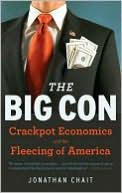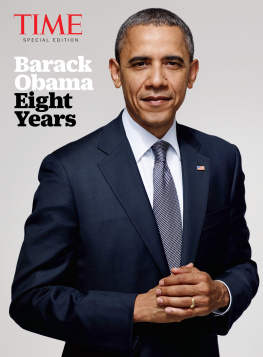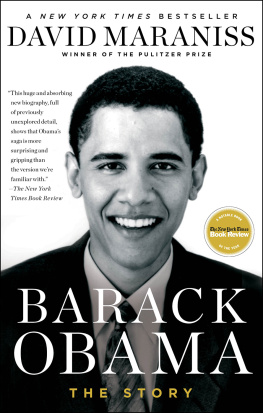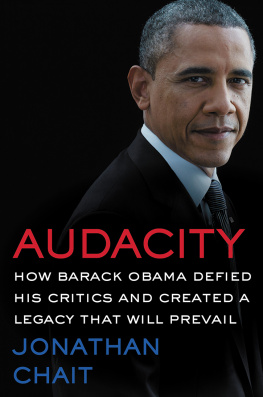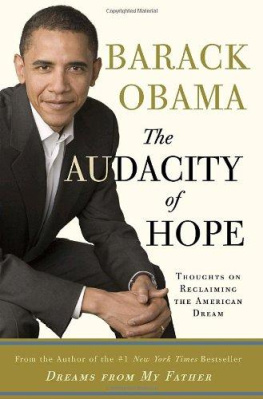Contents
Guide
To my familiesfirst, Mom, Dad and Daniel, and now Robin, Joanna and Benjy. They have given me a life of boundless joy.
On January 21, 2009, Barack Hussein Obama delivered his inaugural address as president of the United States. Thirty-four days later, he appeared before a joint session of Congress to lay out his agenda for the coming session. Between those two speechesthe poetry of the historic inaugural address, and the prose of his more detailed speech a month laterthe young president identified a series of core priorities: fiscal stimulus to prevent the economy from spiraling into depression, health care reform, new regulation of the financial industry, steps to begin transitioning the energy industry to renewable power, an overhaul of schools to make them accountable for results, and a refashioning of Americas moral standing in the world.
The merits of the agenda already provoked bitter dispute. That Obama had set out for himself an astonishingly ambitious agenda was a rare point of universal agreement. The left-wing Guardian newspaper hailed his radical new agenda; David Gergen, a fixture of the Washington establishment who had worked for several Republican administrations as well as Bill Clintons, announced, This was the most ambitious president weve heard in this chamber in decades. Conservatives, naturally, reacted to this sweeping new program with terror. Charles Krauthammer, the Fox News commentator and Washington Post columnist whose views were deemed so influential that a National Review cover story declared him the leader of the opposition to Obama, warned, An ambitious president intends to enact the most radical agenda of social transformation seen in our lifetime. Commentary columnist Jennifer Rubin feared Obamas program would permanently refashion the role of the federal government in the lives of every American. For good or for ill, Obama had proposed change on a massive, historic scale. Neither friend nor foe denied the new presidents audacity.
This book makes the case that Obama succeeded. He accomplished nearly everything he set out to do, and he set out to do an enormous amount. Some of his success was partial rather than complete. And a great deal of it is subject to attack by a Republican government led by Donald Trump. Gleeful Republicans hailed their victory as a rejection of the leader they were never able to defeat themselves. The election outcome is a clear repudiation of President Obama, his policies, his vision, how those policies will be implemented, Eric Cantor, the former House Republican majority leader, told the New York Times, and frankly, I think it reflects the fact that most Americans think he failed.
This was a complete inversion of reality. Obama had the approval of a clear majority of Americans. If not for the Twenty-Second Amendment to the Constitution, which limits presidents to two full terms in office, he very likely could have won a third term easily, with the benefit of a much less popular opponent and a much healthier economy than he faced when he won reelection in 2012. In contrast to the popular Obama, polls registered sweeping disapproval of the Republican Congress. (Unlike Obama, who won both his campaigns decisively, Cantor himself actually was repudiated by his constituents, who voted him out of office in 2014.)
Obamas would-be successor, Hillary Clinton, did face a far more skeptical electorate, whose views of her were shaped by a second-tier scandal over a private email server. Whatever its basis in fact, distrust of Clinton was intensely personal. She lost despite, not because of, her association with the popular sitting president. And even her loss itself reflected the unusual construction of the Electoral College rather than the expressed preference of the voting majority. Trumps aging supporters were disproportionately clustered in battleground states, allowing him to prevail despite her clear win in the national vote.
The myth of repudiation had a clear purpose: to make it appear both fair and inevitable that the conquering Republican government would destroy Obamas legacy. The conclusion even had natural appeal to despairing liberals. But, as we will see, the fatalistic conclusion that Trump can erase Obamas achievements is overstatedperhaps even completely false.
Obamas reactionary opponents are determined to destroy his legacy not because it changed little, but because it changed so much. Any large-scale reordering of power and resources in American life will inevitably face resistance, sometimes for decades. After Lincoln managed to ban slavery, Southern states launched a violent terrorist counterattack, disenfranchising their African-American citizens, subjecting them to constant physical terror, and forcing them into exploitative labor arrangements almost tantamount to slavery. Conservatives never gave up their hatred for Franklin Roosevelts reforms, and the war against New Deal programs has never ended. (In 2005, when freshly reelected George W. Bush set out to privatize Social Security, National Review splashed a smiling Roosevelt on its cover, under the headline, Wipe That Grin Off Your Face, reflecting the rights confidence his signature social insurance program would soon be phased out.) Sweeping reforms create powerful enemies who do not disappear.
And Obamas reforms have worked. The evidence of their success lies not only in laws but in concrete and measurable results. Obamas program has already reshaped the economy, health care, energy, finance, and education in quantifiable ways. Its imprint has gone beyond the realm of theoretical promise and into observable results.
Faced with the enactment of such ambitious reforms, the conservative opposition responded in the expected partisan fashion. After their initial overwrought and frequently hysterical claims that Obama would destroy all that was good about America, they shifted the terms of their critique when their predictions of doom failed to materialize. Instead the very same conservatives who had quaked in terror at the breadth of his ambition began to emphasize that Obama had simply not done much of anything. Krauthammer, once frenzied at Obamas revolutionary ambitions, sniffed five years later that he will be seen as a parenthesis in American political history. Rubin, hopefully anticipating a court ruling to overturn Obamacare that did not come, gloated in 2014 that he will end his presidency with no significant accomplishment... putting him in the running for the most unsuccessful president in history.
More curious than the dismissal by the partisan opposition is how many Americans who did not oppose Obamas agenda came to believe something not much different. Obamas supporters spent most of his presidency in a state ranging from resignation to despair. In the New York Times, journalist Robert Draper identified the central critique of the Obama presidency as being far better versed in hopey-changey atmospherics and cutting-edge campaign tactics than in actual governing. Veteran reporter Howard Fineman, writing in the Huffington Post in 2014, attempting to provide a sympathetic answer to the question, Remember The Fresh Promise Of Barack Obama? What Happened To That Guy?
This was not an idiosyncratic complaint, nor the expression of closeted hostility. The notion that Obama had largely failed to live up to his promise attained the status of conventional wisdom, so widely held that it often required no defense. It was more common to find Obamas defenders excusing his failure to deliver transformational changeit was the economy, or George W. Bush, or the partisanship of the Republicans in Congress that had thwarted himthan to hear them affirm that he had indeed delivered that change. This book records many important thought leaders expressing versions of this conviction, because it is worth placing them in a time capsule nowin the not very distant future, it will be hard to believe people predisposed to agree with Obama thought this way.


